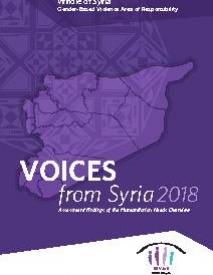Voices from Syria 2018 : Assessment Findings of the Humanitarian Needs Overview
As the war in Syria approaches its eighth year the humanitarian situation has passed a tipping point in terms of generational change. Even if the fighting were to stop tomorrow, the after-effects will continue for many years. This is especially true for women and girls due to the entrenched complexity of the issues they continue to face every day. The scars now run too deep for easy and immediate solutions.
This report provides important insights into the lives of women and girls caught up in the crossfire, providing a valuable guide to help aid agencies in delivering an informed response to gender-based violence (GBV) nationwide. Compared with last year’s report, it is clear that none of the existing forms of GBV have lessened in their impact. Moreover, the higher quality data this year reveal worrying extensions of negative coping mechanisms such as movement restrictions, marriage, polygamy, survival sex, as women and girls adapt as best they can to the exhaustion of protracted conflict in a society with ingrained patriarchal attitudes. By examining each of the different directorates, we can see the vast range in complexities across the country.
With men absent, injured, killed, or unable to find employment the burden of responsibility often falls heavier on the shoulders of women and girls to maintain households. However, these additional responsibilities do not necessarily lead to greater empowerment or freedom for women. Invariably, it leads to an increase in workload and sometimes to additional abuse as men resist a perceived threat to their dominance. From aid distribution to gaining documentation, to attending school, guarding against exploitation and abuse is a constant challenge.
Given the length of the war, the different forms of GBV have often become interlinked. A girl forced into a child marriage five years ago may now be a widow or divorcee (sometimes more than once) with children to protect and feed. With this data, we now are better able to chart the trajectories these survivors have followed. The data and stories contained in this report also highlight, as also documented in previous reports, the important role played by specialized women’s and girl’s services and safe spaces in helping to protect the vulnerable and to mitigate the effects of GBV.
Geachte bezoeker,
De informatie die u nu opvraagt, kan door psychotraumanet niet aan u worden getoond. Dit kan verschillende redenen hebben,
waarvan (bescherming van het) auteursrecht de meeste voorkomende is. Wanneer het mogelijk is om u door te verwijzen naar de bron
van deze informatie, dan ziet u hier onder een link naar die plek.
Als er geen link staat, kunt u contact opnemen met de bibliotheek,
die u verder op weg kan helpen.
Met vriendelijke groet,
Het psychotraumanet-team.
156 pages | Whole of Syria gender-based violence area of responsibility (GBV AoR)
https://www.humanitarianresponse.info/sites/www.humanitarianresponse.info/files/documents/files/2017-12_voices_from_syria_2nd_edition.pdf


